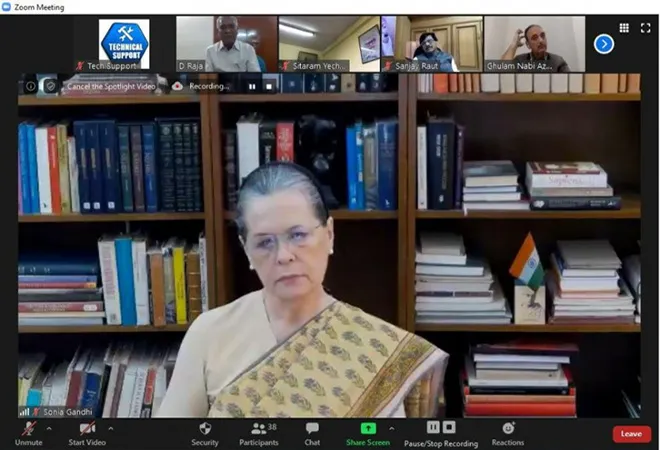-
CENTRES
Progammes & Centres
Location

The recently held virtual meeting by a host of opposition parties regarding India’s fight against COVID-19, after almost two months since the outbreak of the pandemic in the country, can be heralded as the first concerted move of oppositional politics since the beginning of this crisis. This development makes it an imperative to ponder over the role of the political opposition in a democratic polity like India, during this period of contingency. The spread of COVID-19 has catapulted an all-pervasive crisis that impacted every aspect of the socio-political landscape in India as much as in other parts of the world. A crisis also seems to have besieged the oppositional politics in the Indian democratic discourse. The entire focus on how India is dealing with the crisis has been on the governmental policies on containing the spread of the virus and the effective management of the lockdown. As the government in power is the ultimate authority with the entire state machinery and resources to tackle all challenges of governance, the accountability and onus to rise up to the occasion lies with the elected government during any crisis. However, during this entire period when India has been fighting its battle against coronavirus, the opposition remained largely conspicuous by its silence and inactivity. Such a silence can be attributed to two factors which are perceptional and situational in nature.
First, it has been a perception which has permeated the practice of political culture for quite some time. The perception that during a national crisis, the opposition should put up a united front and rally behind the government for the larger national interest, at least in the initial and the most critical juncture of the crisis, deters the opposition from critically reviewing the government’s conduct. Second, the nature of the crisis that COVID-19 posits prohibits most of the space that is traditionally earmarked for oppositional politics. The threat of the contagion prohibits public gathering and demands strict social distancing. So, the possibility of collective protests, dharnas, demonstrations and other means of collective political mobilization remains inconceivable in the present context. Moreover, the parliament which acts as the institutional theatre for demanding governmental accountability by the opposition parties remains non-functional due to the lockdown and social distancing norms. Hence, the space for oppositional politics at the national level, which already shrunk over the years after the political ascendency of the national ruling party, Bharatiya Janata Party (BJP), looks further diminished during this crisis. So the question arises how the opposition can become relevant in a situation where usual template for oppositional politics remains suspended. However, the opposition’s task remains the same, rather increases manifold in such times, despite its constraints.
It is extremely crucial for the opposition to understand that its political role in a robust democracy like India demands it to be more vigilant, active, public-spirited and courageous during such a severe life as well as livelihood crisis, like never before. The present contingency warrants the opposition’s moral as well as political responsibility to relentlessly offer informed criticism of the government’s conduct in handling the crisis. Apart from that, it is also opposition’s duty to effectively pressurize the government to plug the loopholes in its policies and offer credible and better alternatives to adroitly deal with the crisis. For the same , the opposition political forces in India should embrace clearly, their role as an institutional watch dog as well as a credible platform with a plausible vision and capacity to offer assistance in terms of policy alternatives as well as assurances to the vulnerable sections of hapless citizenry.
The pandemic and the prolonged nationwide lockdown has precipitated an exceptional situation in India in which the response, efficiency and the performance of any elected government in power demanded attentive and rigorous oppositional scrutiny in every step during the entire course of the crisis. A plethora of issues ranging from the repercussions of a hurriedly imposed lockdown, the unimaginable plight of the internal migrant workers and other economically vulnerable sections, health infrastructure related preparedness that includes availability of medical equipments, trained personnel, centre-state coordination and the remedial measures against economic slowdown, posed different challenges of governance. The response of the opposition parties in India remained largely negligible is addressing any of these concerns in a persistent and articulate manner. Apart from the flagging of symbolic notes of protestation over social media and the few prescriptive letters written to the government, especially by the national opposition party, Indian National Congress (INC), not much political furor over the pressing issues were visible. No notable concerted attempts on the part of the opposition were seen to make a vehement protest against the administrative excesses that were meted out of the common people as well as journalists in the course of curbing the contagion.
It is only after almost two month of inaction, the opposition parties came together to discuss some of these vital issues. Intractable challenges like the predicament of the migrant workers and other marginalized populace, stringent labour laws and need for resumption of the parliamentary working for allowing the oppositional oversight function over the governmental policies were highlighted. However, such delayed discussion is largely being viewed as “too late and too little”. Nevertheless, coming together of rival political forces like the left parties and the Trinamool Congress (TMC) and the presence of unlikely newfound political allies like Shiv Sena is a positive gesture of oppositional unity, despite its volatility. Moreover, the convergence of these disparate political forces under the same platform to discuss the national crisis at the behest of the Congress President Sonia Gandhi, might refurbish some hopes regarding the remnants of the political clout of the otherwise battered Congress party at the national level. The absence of other key players like Bahujan Samaj Party (BSP), Samajwadi Party (SP) and the Aam Aadmi Party (AAP) in the meeting reflects the fissures that the ongoing crisis couldn’t bridge within the opposition camp. Hence, more persistent and substantive efforts to galvanise the democratic political space in order to play a credible monitoring role over the government, both within the institutional space and also beyond it, is the dire need during this crisis.
Besides the role as an institutional watchdog of the government, the opposition parties should also mobilize their existing resources to provide effective alternative models of governance that can assuage the sufferings of the people during this crisis. This can be achieved in two ways. First, most of these opposition parties in India are themselves in power in quite a few states in India. Despite their jurisdictional and financial constraints, they can devise effective strategies of governance to deal with the bludgeoning crisis in their own respective states. But recent happenings bear testimony to the fact that most of these parties which are in power in the states have exhibited apathy, lack of preparedness and inefficiency in dealing with the crisis which are not very different from the indictments against the central government, with Kerala being an exception. Probably, it is the questionable record of these opposition parties in their own turf which deterred them from launching a stronger protest against the performance of the central government. The recent launch of the Rajiv Gandhi Kishan Nyay Yogna by the congress government in the interest of the farmers, with all its limitations, can be a modest starting point in the direction of charting positive alternatives.
Second, even in states in which they aren’t in power, the organisational and mobilisational resources on the ground level of these opposition parties can be used to channelize the essential services to the needy and scrutinise the administrative loopholes and policy challenges at the local level in order to draw the attention of the government immediately. This would help to once again shift the theatre of politics to the people and would reassure the vulnerable in these times of grave need and deprivation. But, such attempts so far has been reduced to agendas of political hoodwinking and muscle-flexing between the government and the opposition forces. Political maturity, empathy and pragmatism would ensure that the political discourse can be alleviated from such opportunism to something more credible and reliable during such a crisis. The 11 points demand flagged during the opposition’s meeting should be a harbinger to a more proactive, vigilant and credible discourse of oppositional politics during the pandemic.
It is not to suggest that the active and vigilant demeanor of the opposition would invariably ensure unfettered accountability from the ruling party, especially when it enjoys stable parliamentary majority and adequate popular support. Nor is the proposition being endorsed that a credible opposition can compensate for governmental inefficiency or flaws. However, a responsible opposition can undoubtedly keep an elected government constantly on its toes in its management of a crisis of this magnitude, both for the interest of the nation and its people as well as for its own political revival. Hence, space for oppositional politics in a democracy must further expand and not shrink in the face of a severe crisis.
The views expressed above belong to the author(s). ORF research and analyses now available on Telegram! Click here to access our curated content — blogs, longforms and interviews.

Ambar Kumar Ghosh is an Associate Fellow under the Political Reforms and Governance Initiative at ORF Kolkata. His primary areas of research interest include studying ...
Read More +